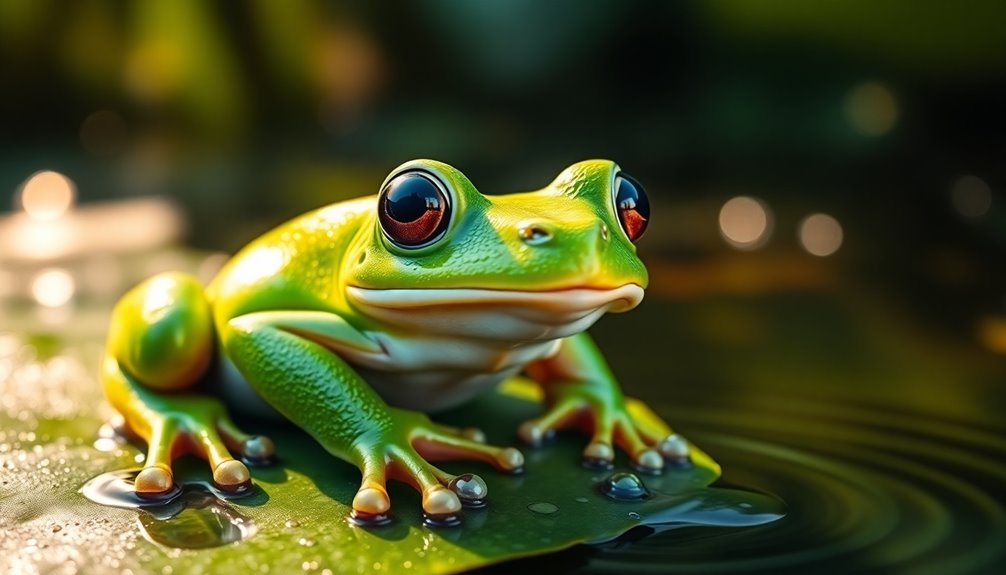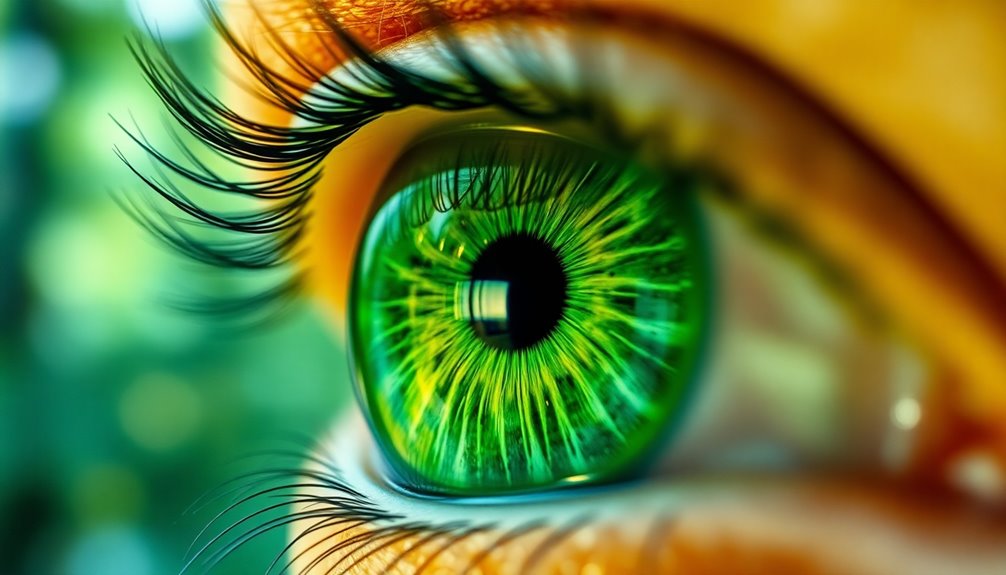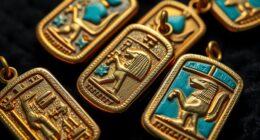Frogs are vibrant symbols of transformation and growth! They take you on a journey from egg to tadpole to adult, showing how change is a part of life. When you see a frog, think about resilience and courage. Frogs remind you to let go of the past and welcome new beginnings. Many cultures also celebrate frogs for their association with fertility and prosperity. They even help you connect with nature's magic. Plus, frogs are important for keeping our environment healthy! If you keep exploring their story, you'll discover even more fascinating meanings behind these amazing creatures.
Key Takeaways
- Frogs symbolize transformation and personal growth through their life cycle, encouraging adaptability and resilience in the face of change.
- In various cultures, frogs represent fertility, wealth, and are seen as messengers of renewal and good fortune.
- Frogs are viewed as bioindicators of environmental health, reflecting the state of ecosystems and highlighting the importance of habitat preservation.
- Their metamorphosis from tadpole to adult emphasizes the necessity of embracing change for personal evolution and emotional balance.
- Frogs serve as inspiration in modern culture, symbolizing adaptability and positive energy in art, literature, and folklore.
Symbolism of Transformation
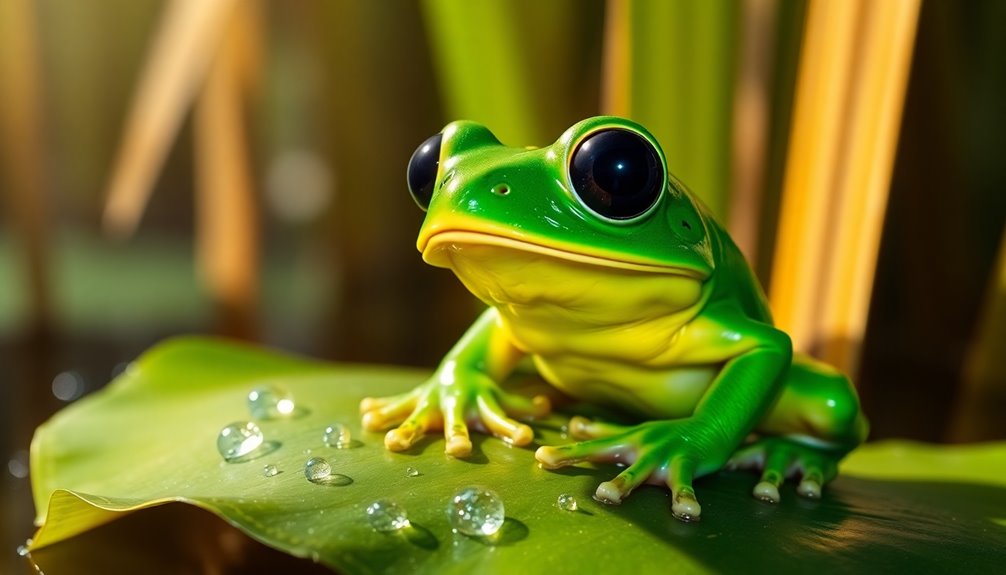
When you think about transformation, frogs offer a powerful symbol of change and growth. They start as tiny eggs, then become wiggle-tailed tadpoles, and finally grow into hopping frogs. This amazing journey shows how we can change and grow in our own lives. Just like frogs, you can adapt to new situations, showing resilience and courage when facing challenges.
Frogs remind us that it's crucial to let go of the past and embrace new beginnings. They're often seen as messengers of renewal, encouraging you to release old habits and negative energy. When you think about their spiritual significance, it highlights the importance of emotional cleansing. By letting go of what holds you back, you create space for personal evolution.
Also, frogs lay thousands of eggs, symbolizing fertility and the potential for abundant opportunities. This teaches you that change can lead to many exciting possibilities.
Cultural Significance of Frogs
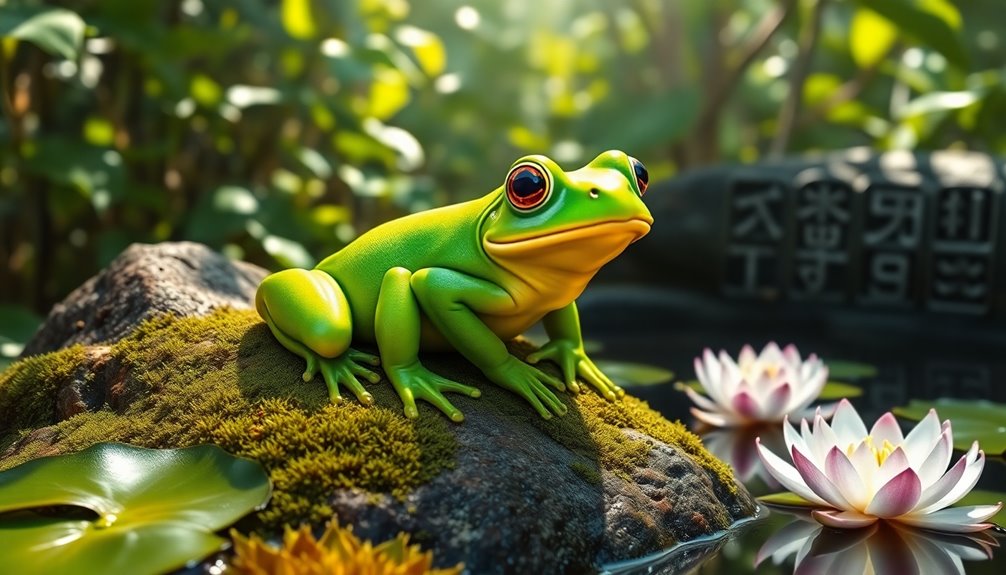
Frogs have a rich cultural significance around the world, and it's fascinating to see how different societies view them.
In ancient Egypt, they symbolized fertility, while in China, a three-legged money frog is a lucky charm for wealth.
From rainmakers in Native American tribes to symbols of life-giving water in Celtic myths, frogs connect us to nature and our shared beliefs!
Ancient Beliefs and Practices
Throughout history, various cultures have revered frogs for their rich symbolism, often linking them to crucial aspects of life. In Ancient Egypt, frogs represented fertility and renewal, closely tied to the goddess Heqet, who symbolized childbirth and motherhood. Imagine how important that was for families!
The Aztecs saw frogs as messengers of Tlaloc, their rain god. They believed these little creatures were essential for agricultural prosperity, which means they helped plants grow!
In Chinese culture, the three-legged money frog is a popular symbol of good fortune and wealth, often found in homes and businesses to attract prosperity.
Native American tribes viewed frogs as rainmakers. These amazing amphibians embodied the water cycle, reminding people of the life-giving properties of rain, crucial for their crops.
And in Celtic mythology, frogs are linked to life-giving water, reflecting the duality of nature. They symbolize healing and the destructive forces of the environment.
These examples show how frogs hold significant cultural symbolism across different ancient beliefs. You can see how these little creatures are more than just fun to watch; they connect deeply to life, nature, and abundance!
Symbolism Across Cultures
Many cultures around the world have embraced the frog's symbolism, viewing it as a powerful representation of transformation and renewal. In Ancient Egypt, frogs were linked to the goddess Heqet, a spirit of fertility. They can lay up to 4,000 eggs daily, which made them perfect symbols of new life.
Over in China, the three-legged money frog is celebrated as a symbol of good fortune and wealth, believed to attract prosperity to homes.
In North America, Indigenous peoples see frogs as rainmakers, embodying the connection between water and life. When you spot a frog, it often brings a sense of hope and positive energy.
The Aztecs also saw frogs as special messengers of renewal, connecting them to Tlaloc, the rain god, emphasizing their role in farming and growth.
Celtic mythology tells of frogs representing the duality of nature, showing both healing and destruction. Their ties to life-giving water make them significant in many rituals.
Frogs truly embody the spirit of fertility and transformation across cultures, reminding us of the incredible power of nature and new beginnings.
Modern Interpretations and Uses
The enduring symbolism of frogs continues to resonate in modern interpretations, reflecting their adaptability and transformative nature. You might notice frogs popping up everywhere, from books to movies, reminding us that change can be a good thing. They symbolize transformation, showing how you can navigate life's twists and turns with grace.
In Chinese culture, the three-legged money frog is a famous symbol of wealth. Many people keep this lucky charm in their homes, hoping to attract prosperity and good fortune. Isn't that exciting?
Frogs also leap into popular culture, like Kermit the Frog and Michigan J. Frog, who bring joy and laughter to our screens.
Artistic representations, like those in Native American totem poles, show frogs as spiritual beings that connect us to deeper meanings. They remind us of renewal and the endless possibilities life offers.
Frogs often appear in proverbs and folklore, reinforcing their role as symbols of transformation.
Ecological Importance of Frogs
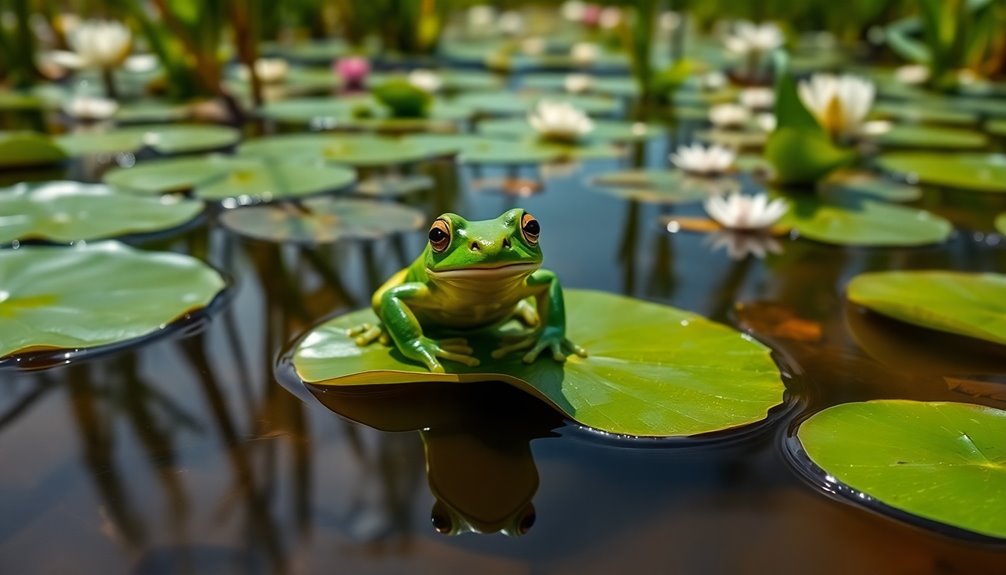
Frogs are more than just cool creatures; they're like nature's little detectives!
Their presence in different habitats shows us how healthy our environment is, and they help keep the balance by munching on pesky insects.
With climate change affecting their populations, it's important to pay attention to these amazing amphibians and what they tell us about our world.
Environmental Health Indicators
Frogs' permeable skin makes them exceptional bioindicators of environmental health, as they're highly sensitive to pollutants and shifts in their ecosystems. This means that when you see frogs thriving in a pond, it's a good sign that the water is clean and healthy. On the flip side, if frog populations start to decline, it can show that something's wrong in their environment.
These amazing creatures play a crucial role in both aquatic and terrestrial ecosystems. They help keep insect populations in check, which is important for maintaining a balanced ecosystem. Plus, frogs are prey for many animals, helping to support the food web. When you think about ecosystem integrity, frogs are like nature's little detectives, alerting us to changes and potential problems.
Sadly, many frog populations are in trouble due to habitat loss, pollution, climate change, and diseases. Protecting frogs and their habitats not only helps them but also benefits the entire environment.
Biodiversity and Ecosystem Balance
In ecosystems, maintaining biodiversity is crucial for balance, and frogs play a key role in this process. These amazing creatures act as bioindicators, meaning they tell us a lot about the health of their environment. Their sensitive skin makes them susceptible to pollutants, so when frog populations decline, it's a signal that something's wrong.
Frogs also help with nutrient cycling. They break down organic matter, which keeps the soil fertile and supports a balanced ecosystem. Plus, they're fantastic at controlling insect populations! Some frogs can eat thousands of pests every day, reducing our need for chemical pesticides.
You might be surprised to learn that frogs live in both water and on land. This unique position makes them important bridges between these ecosystems, supporting biodiversity and helping different species interact.
When frog populations drop, it's a sign of bigger environmental problems, like habitat loss. By protecting frogs, we're helping guarantee ecosystem balance.
Impact of Climate Change
The delicate balance of ecosystems is increasingly threatened by climate change, and frogs are feeling the impact firsthand. These amazing creatures are more than just cute; they're essential for a healthy environment!
Let's look at why frogs matter so much:
- Frogs are bioindicators, showing us how healthy our environment is.
- Their sensitive skin makes them vulnerable to pollution and habitat changes.
- Climate change disrupts their breeding cycles and where they live.
- Global frog populations have declined by about 40% since the 1970s.
- The chytrid fungus disease has hit frogs hard, making them even more at risk.
A frog is associated with many different roles in the ecosystem, helping to control pests and contribute to nutrient cycling.
But with climate change making things tougher, we need to act! Protecting frog habitats is essential for keeping our ecosystems balanced.
By doing so, you're not just saving frogs; you're helping the entire environment thrive.
Frogs in Mythology and Folklore
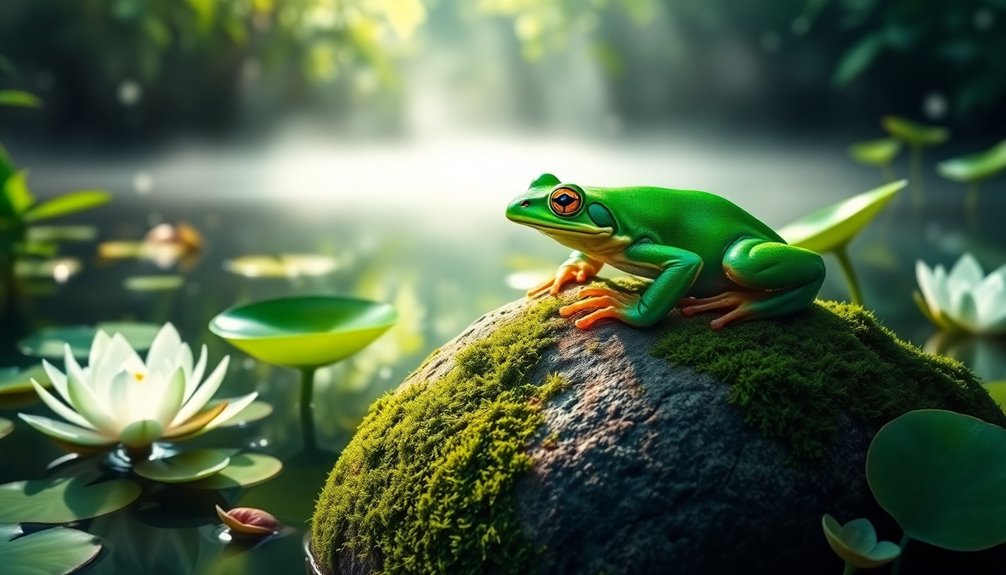
Often found in diverse mythologies and folklore around the world, frogs symbolize transformation and change. These fascinating creatures are more than just amphibians; they represent the journey of life! From tadpole to frog, they show us how growth can happen.
Here's a fun look at frogs in different cultures:
| Culture | Frog Symbolism | Fun Fact |
|---|---|---|
| Ancient Egypt | Fertility and childbirth | The goddess Heqet was a frog! |
| Indo-European | Underworld and sickness | They have a dual nature! |
| Greek & Roman | Moral lessons and desire | Aesop wrote about them! |
In many traditions, frogs are seen as spirit animals, connecting people to nature and magic. They often play key roles in rituals, helping to bridge the gap between the physical and spiritual worlds. Whether they symbolize new beginnings or caution against desires, frogs remind us of the constant change in our lives. So next time you spot a frog, think of the amazing stories it carries!
Personal Growth and Reflection

Personal growth and reflection frequently require you to embrace change, much like a frog transforming from a tadpole. This journey can be exciting, filled with ups and downs as you discover your true self.
Frogs remind us that transformation is essential in life. Here are some ideas to think about:
- Embrace change to grow.
- Be adaptable in different situations.
- Let go of negative feelings.
- Find emotional balance in your life.
- Stay grounded while you evolve.
Just like frogs thrive in various environments, you can learn to navigate life's challenges. Reflecting on your experiences helps you release emotional baggage, making space for new beginnings.
The water symbolizes your emotions, while the land represents your stability.
When you align with your goals, you'll notice personal growth. It's all about being ready to change and evolve. Additionally, understanding the importance of continuous learning can further enhance your journey toward personal development.
Frog Sightings and Omens
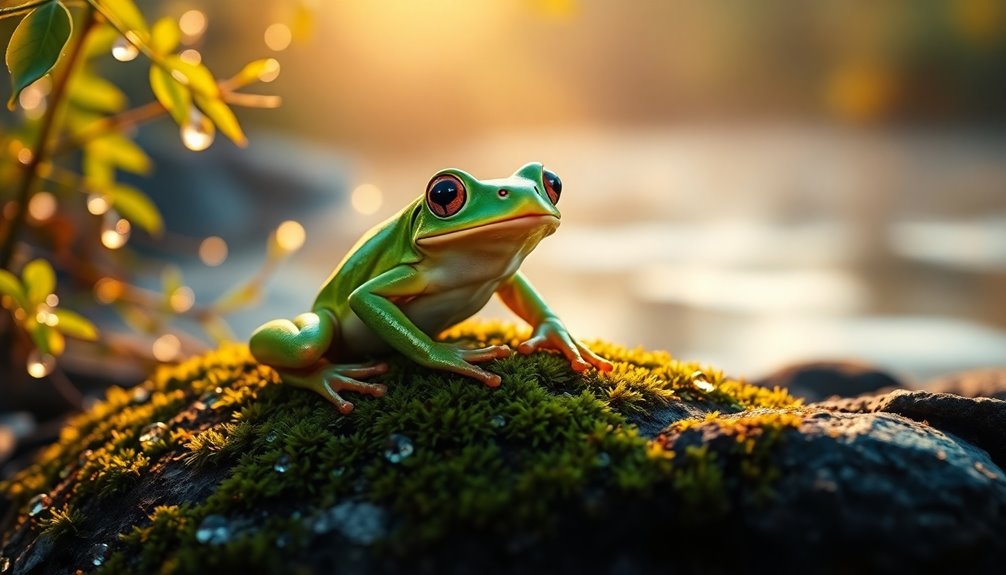
Spotting a frog can feel like a whisper from nature, hinting at renewal and transformation. In many cultures, these little creatures carry meaningful messages. When you see a frog, it might just be a sign of good fortune or a fresh start.
Here's a quick look at how different cultures view frog sightings:
| Culture | Meaning |
|---|---|
| Chinese | Wealth and prosperity |
| Indigenous North American | Transformation and new beginnings |
| Xhosa (South Africa) | Potential bad omen |
In Chinese culture, frog sightings are often linked to financial gains. You might feel a spark of hope for prosperity when you encounter one! Meanwhile, Indigenous tribes in North America see frogs as reminders of nature's cycles, representing change and new beginnings. But not all interpretations are positive. For the Xhosa tribe, spotting a frog could mean something more ominous.
Scientific Contributions of Frogs
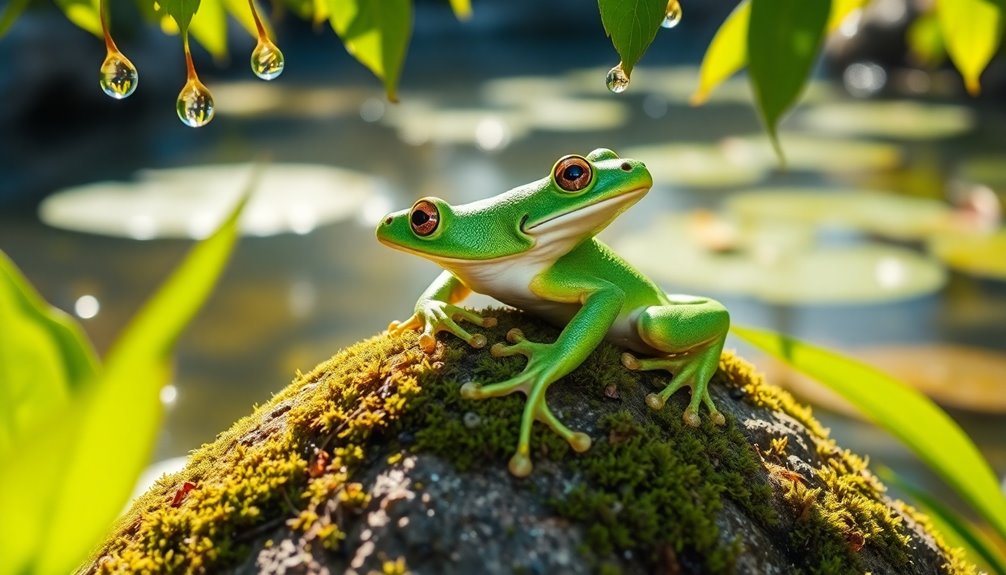
Frogs play an essential role in scientific research, particularly in fields like embryology and environmental science. Their contributions are amazing and help us understand our world better!
- Frogs' eggs are easy to access and observe, making them perfect for embryology studies.
- Their metamorphosis offers insights into hormonal changes and cellular development.
- Frogs act as bioindicators, quickly showing us how healthy our environment is.
- Research on frog skin compounds is leading to new pain relief and antimicrobial medicines.
- Their ability to regenerate limbs informs studies on healing and tissue regeneration in humans.
These scientific contributions from frogs help researchers learn about life and health. When you think of frogs, remember they're not just cute creatures; they're crucial to our understanding of biology and the environment!
By studying frogs, we gain knowledge that can lead to important medical advancements and a healthier planet. Their sensitivity to pollutants makes them excellent bioindicators, letting us know when something's wrong in our ecosystems.
Artistic Representations of Frogs
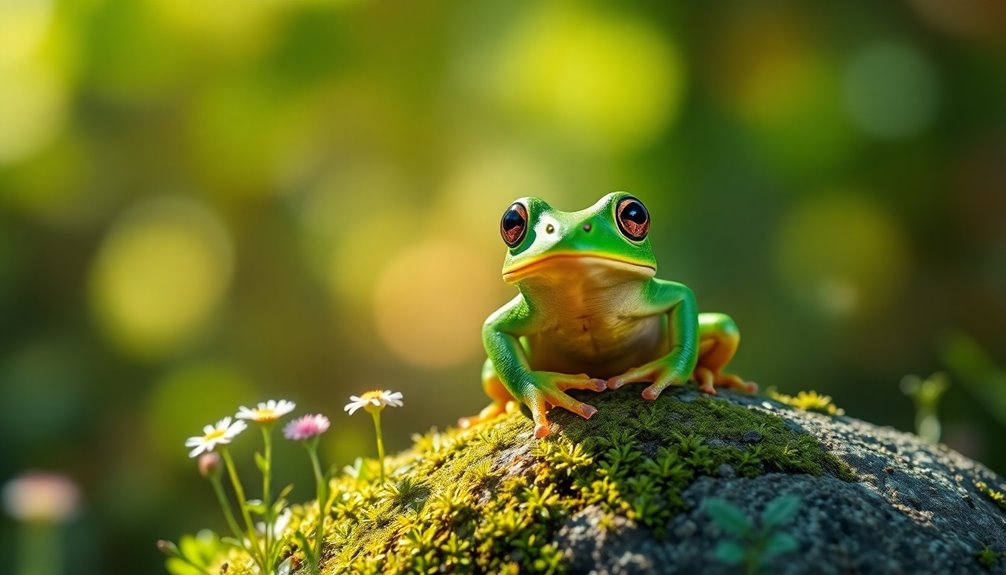
Art inspires many interpretations of frogs, showcasing their significance across cultures. In Native Northwest Coast art, frogs are often depicted as symbols that connect the human and spirit worlds. You might see them on totem poles and household items, highlighting their important role in storytelling.
Frogs are also associated with resilience and adaptability. Artists often place them at the bottom of totem poles, reflecting how these creatures thrive in different environments.
In ancient cultures, vibrant colors and intricate designs illustrate frogs as motifs of fertility and abundance, drawing attention to their lively presence.
You'll notice that the frog's wide mouth and protruding tongue are common features in these artistic representations. These traits symbolize abundance and the sharing of knowledge within cultural narratives.
Frogs convey important themes like rebirth and good luck, reminding us of nature's interconnectedness.
Guided Practices for Connection

Connecting with the symbolism of frogs can be a transformative experience. You can explore this connection through various guided practices that encourage growth and change. Here are some fun ways to get started:
- Visualize a tranquil pond to enhance clarity and intuition.
- Practice the frog pose in yoga for physical transformation and hip opening.
- Use frog-themed oracle decks for spiritual insights and reflections.
- Incorporate frog symbolism into daily meditations for emotional release.
- Explore cultural interpretations of frogs through art and literature.
Each practice helps you tap into the frog's energy, which represents adaptability and renewal. For instance, when you visualize the pond, imagine how frogs thrive there, guiding you to let go of fears.
The frog pose in yoga isn't only fun but helps your body open up, just like a frog jumping into the world with confidence. By reflecting on frog-themed oracle cards, you can discover personal growth opportunities.
These activities deepen your understanding of frog symbolism and enrich your journey of transformation. So, plunge into and enjoy the magical connection with frogs!
Frequently Asked Questions
What Is the Spiritual Meaning of a Frog?
The spiritual meaning of a frog is all about change and growth!
When you see a frog, think of how it transforms from a tiny tadpole into a lively frog. This shows you can also embrace new beginnings and let go of old, negative feelings.
Frogs remind you to be adaptable, just like they thrive in water and on land. They invite you to connect with nature and explore your own feelings.
Isn't that exciting?
What Do Frogs Indicate?
Frogs indicate a lot about change and growth in life. When you see a frog, it often means new beginnings are on the way! They remind you to embrace transformation and let go of the past.
Frogs also help us understand the health of our environment, acting like nature's little messengers. So, when you spot a frog, think of it as a sign that exciting changes and opportunities might be just around the corner!
Is It Good Luck if You See a Frog?
When you spot a frog hopping by, it might just be a sign of good luck!
For example, imagine you're outside, and a green frog jumps right in front of you. Many cultures believe this means something wonderful is on the way, like new opportunities or prosperity.
Frogs are often seen as symbols of renewal and transformation, which can bring exciting changes to your life.
What Is the Metaphorical Meaning of a Frog?
When you think about frogs, you can see them as a symbol of change and growth. They start as tiny eggs, turn into tadpoles, and finally become adult frogs.
This journey shows how important it's to embrace change in your life. Frogs also remind you to balance your feelings and practical matters.
Conclusion
To sum up, frogs are more than just creatures that hop around. They symbolize change, reminding us that transformation is always possible. From their roles in different cultures to their presence in stories, frogs inspire us to grow and reflect. When you see a frog, think of it as a little messenger of new beginnings. So, let's celebrate these amazing animals, cherish their beauty, and learn from their journey. After all, every leap they take can inspire our own!

